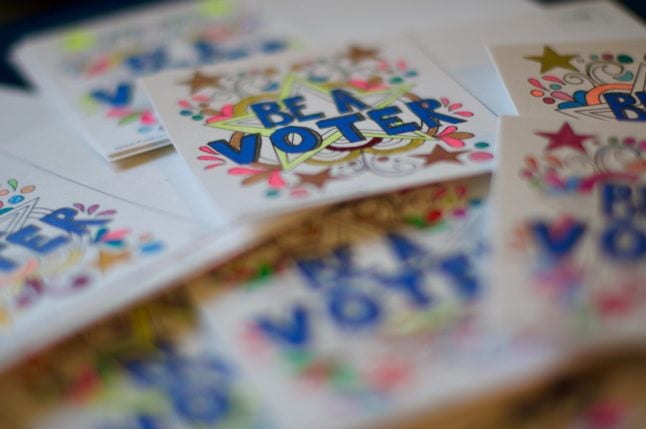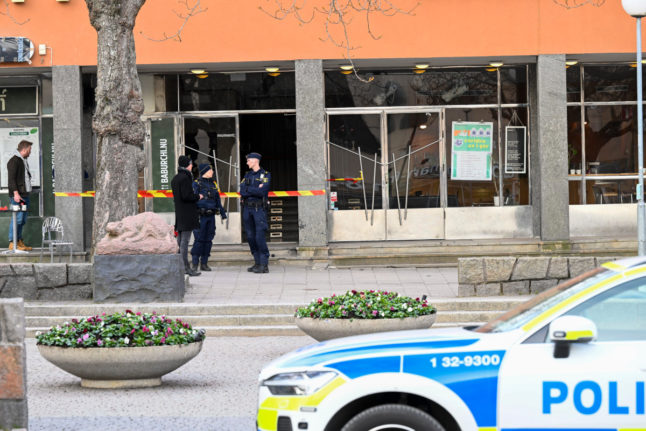The three Scandinavian countries each have different rules on citizenship. As such, foreign residents in comparable situations in each of the three countries are likely to wait for different amounts of time before qualifying for citizenship.
READ ALSO: How do Sweden’s citizenship rules compare to Denmark’s and Norway’s?
All three countries only allow citizens to vote in parliamentary elections, although they do have rules allowing foreigners to take part in local elections in some cases.
Because citizenship rules affect the number of foreign-born (and in some cases, also domestic-born) residents who have the right to vote, they also affect the overall proportion of the population which can vote.
Sweden
Citizenship
EU and non EU citizens can apply for Swedish citizenship after living in Sweden for five continuous years with right of residence. In some cases, this period can be shortened.
In addition to length of stay, EU and non EU citizens must have “conducted themselves well in Sweden”, and the Swedish Migration Agency requests information on debts and criminal records in the country. An application can be rejected if a person has unpaid taxes, fines, or other charges.
While Swedish language skills and knowledge of Swedish society are not currently a requirement for citizenship, this could change in the future.
The application costs 1,500 Swedish kronor, around 150 euros.
READ ALSO: How to get a faster decision on your Swedish citizenship or permit application
Election eligibility
According to data from Sweden’s Statistikdatabasen, there are 8,254,086 people aged over 18s in Sweden as of 2021.
At the country’s election in September, 7,712,103 people were eligible to vote, according to official figures.
As such, over 540,000 adults or around 6.5 percent of over 18s in Sweden do not have the vote in parliamentary elections because they are not Swedish citizens.
Norway
Citizenship
EU and non EU citizens can apply for Norwegian citizenship after living in Norway for eight years out of the past eleven years and if they have held residence permits that were each valid for at least one year during that time.
A new rule, which came into effect in January 2022, means that if you have sufficient income, you can apply after six years rather than eight.
People with Norwegian spouses, registered partners, or cohabitants can apply after living in Norway for three of the last ten years.
Applicants must also pass Norwegian language tests and a citizenship test. Required documentation includes a full list of entries into and departures from Norway, at least seven years of tax returns, and a police report certifying “good conduct”.
It costs 6,500 kroner (620 euros) to apply if you are over 18. However, the fee is cheaper or completely waived if you are a Nordic citizen, previously held Norwegian citizenship, or are under 18 years of age.
READ ALSO: EXPLAINED: How to apply for Norwegian citizenship
Election eligibility
At the most recent Norwegian parliamentary election in 2021, 3,892,507 people had the right to vote according to Statistics Norway. Of these, 344,976 had “immigrant background”, meaning they have at least two non-Norwegian parents and four non-Norwegian grandparents. Among them, 62,093 “new citizens” voted for the first time. Norway began permitting dual citizenship in 2020, meaning the number of “new citizens” able to vote in 2021 nearly doubled compared to the previous election.
Of the country’s total population of 5,425,270 in 2022, 1,111,010 are aged 19 or under. That gives around 4,300,000 eligible voters – rounding down and leaving a margin for error because the Norwegian data groups 19-year-olds with younger age ranges.
According to The Local’s calculation based on these numbers, approximately 9.5 percent of adults in Norway are not eligible voters.
Denmark
Citizenship
To qualify for Danish naturalisation, applicants must meet a number of closely-defined criteria and requirements.
These fall into six broad categories: Give a declaration of allegiance and loyalty to Denmark; fulfil prior residency criteria (normally nine years); be free of debt to the public sector and be financially self-sufficient; have no criminal convictions; hold a full-time job or self-employed for three and a half of the last four years; meet criteria for Danish language skills; and pass a citizenship test and demonstrate knowledge of Danish society and values.
People married to Danes can qualify after 6-8 years, depending on the length of the marriage.
Danish citizenship can only be granted to foreign nationals via legal nationalisation: your application must actually be voted through in parliament. Denmark has allowed dual citizenship since 2015.
Applications are sent to the Ministry of Immigration and Integration for a processing fee of 4,000 kroner (540 euros) (2022 price).
READ ALSO: How to apply for citizenship in Denmark
Election eligibility
The proportion of Denmark’s population that does not have the right to vote has grown from 2 percent in the 1980s to over 10 percent at the upcoming parliamentary election on November 1st.
As many as one in seven of the 1.7 million inhabitants of Greater Copenhagen who are over 18 years old do not have Danish citizenship, meaning they do not have a say in the parliamentary election, according to Statistics Denmark data reported by local media TV2 Lorry.
When broken down by municipality, the proportion of local populations without the right to vote can reach as much as one in four.
Based on Statistics Denmark’s figures, 19.6 percent — almost one in five — of residents in Copenhagen Municipality cannot vote because they are not Danish citizens.
In Ishøj, a municipality in the Greater Copenhagen area, that rises to as much as 25.4 percent, just over one in four.
READ ALSO: Danish citizenship rules ‘partly to blame’ with one in seven in Copenhagen unable to vote
An increasing proportion without the right to vote is bad news for democracy, according to Roger Buch, election researcher at the Danish School of Media and Journalism. Buch’s comments were given to TV2 Lorry in relation to the media’s report on Copenhagen’s relatively low proportion of eligible voters.
“We are beginning to move in the direction of something we otherwise only shake our heads at and resent. We are very good at spotting when other countries do something wrong and – rightly – criticise deteriorations in others’ democracies,” he said.
“We must therefore ask ourselves: How long can we live with this? How high can we go? Can we live with 15 percent nationally not having the right to vote? 20 percent? One in four? Because of the trend continues, the proportion will only grow,” he said.
READ ALSO:



 Please whitelist us to continue reading.
Please whitelist us to continue reading.
Member comments